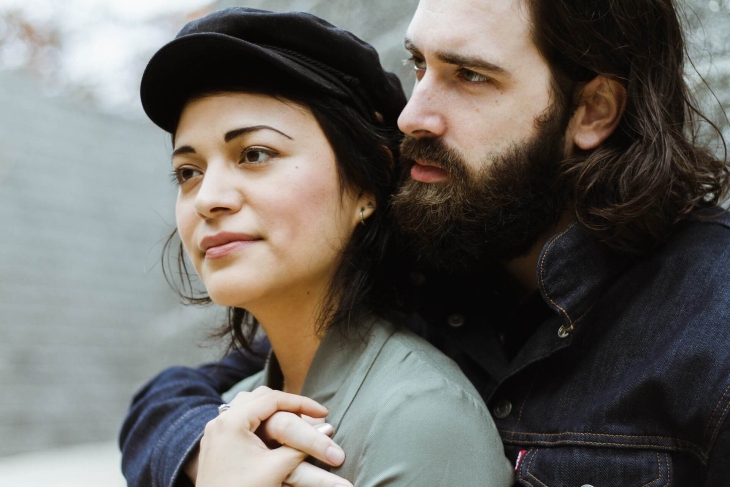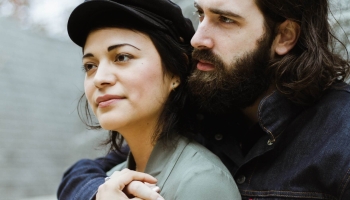
Loving an addict, or being in love while addicted, is one of the hardest emotional struggles you can face in this life.
There is a treatment gap in America, where it is estimated that one in seven people suffer from addiction, but of those suffering, only one in ten get help at a treatment facility. This treatment gap puts more of a strain on significant others to bear the full weight of supporting a loved one struggling with addiction.
This Valentine’s Day, we reached out to former addicts and their loved ones, who were kind enough to share their [stories of the addicted heart] with us. Below you will find true stories of addiction and relationships, and the love that was challenged throughout it all.
Our First Sober Valentine’s Day Together
Hi, my name is Alaina, and I am an addict.
Yes, it is true this cliché line may be difficult for some to muster. I have come to the realization that myself, as well as my husband, are recovering addicts living a relatively functional existence. We are everyday people with careers, children, two dogs in the front yard, but also a past. We struggled with addiction together, and sometimes I wonder if a higher power put us in each other’s path for this reason. I can tell you, the road to sobriety is a tough one, but it is well worth it in the end. I have felt the strain that addiction to illicit drugs and alcohol can bring to a relationship. We love each other, and our love has conquered everything. What is so important about today is this is the first Valentine’s Day that we will be spending together, finally, since addiction has stolen this important day from us in the past.
— Alaina
My Marriage Became a Ménage á Trois with Alcohol
We were in love and happy; the standard love story. Then life happened… and I didn’t like it much!
What began as two glasses of wine a night became two bottles (and then more) as I learned that alcohol delivered on its promise to ‘numb!’ Slowly my marriage became a ménage á trois with King Alcohol as the third party.
Alcohol took over my life! I told countless lies to protect my lover – alcohol – and my husband saw through them all. We fought a lot and I screamed and cried a lot. In a tender moment, he once asked, “Why are you doing this?” My answer was simple: “because I can’t stop.” I was consumed with shame but I couldn’t stop drinking.
I didn’t believe my relationship would survive. Yet, with a lot of work and some time, we made it and today are content and happy. Last month I celebrated seven years sobriety, and soon we will celebrate our twentieth wedding anniversary!
I remember the vows we took – “for better, for worse… in sickness and in health.” My husband was certainly true to his.
— Melissa*
We Were in a Committed Relationship with Our Drug Dealer
My relationship with Karen* was during a time of internal turmoil. I think one has to be in a state of turmoil to be willing to attempt having a romantic life when they’re already in a twenty-four-hour relationship with addiction.
I don’t like to come across as cynical. There were some beautiful moments in our relationship – but trying to maintain a loving relationship is impossible when your primary focus is on maintaining a healthy relationship with your drug dealer. The fleeting moments of love that we shared were trumped by the constant sickness, screaming, and stress that painted the hours of our daily lives. Our priorities were much more related to getting high than they were to develop a sustainable relationship. Love is an emotion, and the dope that we were so focused on scraping together had blunted our understanding of emotion entirely.
We split at the peak of our addiction. We still check up on each other, and it looks like we’re slowly watching each other build ourselves up; developing an appreciation and zest for life as sober individuals. Maybe, once we’re stable enough to support ourselves, we’ll be able to support each other.
I hope so.
— José*
I Put the Love for the Drug Before My Boyfriend
While I was using drugs, I met someone who was not an addict. I continued to use while we dated, but he got fed up with my addiction. He left, and told me we could only be together if I pulled my act together and got clean. Looking back, I now realize I put my love for the drug before him.
So, after the period of solitude, I finally pulled my act together and tried my level best to stay clean without any support. It worked out in the end – my boyfriend returned to me when he saw my progress. We are now married and I’m living and loving the sober life!
— Angela*
My Dog Sniffed Out the Truth
She’s the only woman I kissed on a first date. She resembled a blonde Chrissy Metz of “This Is Us.” My mother, prejudiced against overweight women, said she was breathtaking and hoped we would marry.
If Mom only knew.
We had a long-distance relationship for two years, and she was open about the fact she would “party” when I wasn’t there. In love, I entered deep denial about whatever happened in my absence.
It was my dog who forced me into reality. Like some wannabe K-9, my dachshund sniffed out some “help” in her apartment – and then peed next to it. My embarrassment only temporarily obscured the truth; this woman I loved was an addict. I admit I wouldn’t have broken up with her – so she did with me. She couldn’t handle my judgment, she said.
I miss her to this day.
— James*
Crystal Meth Brought Us Together… and Then Apart
At the tender age of 16, young, naïve and totally carefree, I got hooked on crystal meth. During this time, I was living in a new city and didn’t have many friends and that’s when I befriended an older man. With the age difference, we had absolutely nothing in common, except our mutual love for crystal. It wasn’t long until I fell pregnant.
All we ever did was get high and when we weren’t, it felt awkward. Looking back now, I realize that it was NOT love. The only love that we shared was our love for the drug… After giving birth, I managed to maintain sobriety for a year, but he was still actively using, and I relapsed. We parted ways – my family made this happen. Which is one of the best things that happened to me.
I learned the hard way that when both partners are addicted, it’s even more difficult to recover if one of you doesn’t want to get sober, since the temptation is always there.
— Brianna*
We Were Young, Dumb, and In Love
Being addicted and in love is not like anything.
I fell in love with a boy at the age of fifteen, but I don’t think it had to do with the drugs. We had a special connection, and if anything, the drugs enhanced that. We met in my neighborhood while smoking pot with other friends – we were typical stoners in high school. My boyfriend got me into MDMA when I was in grade ten, and I was hooked. We were so stuck on being high and in love because it amplified everything, especially on the “love-drug.” It never affected our relationship, if anything it brought us closer together, but during the come-downs, we would argue.
Being addicted and in-love felt powerful, but it was destructive. We are still together years later, and are both in healthier mind states as we have stopped the heavy drug use. To anyone dating an addict that is hurting themselves and their relationship, I’d say: seek help or get out. As harsh as that may be, sometimes you can’t help out an addict. They will only seek out help when they are ready.
— Michelle*
Self-Medicating Ended My Relationship
Being in love with an addict is time-consuming, mentally draining, and physically exhausting. I used to think that I could handle anything— but it was dating an addict which really pushed me to the brink.
I met Tasha* during my first year of grad school, and our first few months together were amazing. We went out on dates to exclusive restaurants, and took weekend trips to the beach. After a few months of dating, Tasha lost her job, and soon after she lost her father. She began self-medicating with alcohol, and it wasn’t long until our fights started. I would try to tell her to get professional help, and she would say I wasn’t supporting her enough. Everything I tried to do to help seemed to push her away even further, and her drinking habits were getting worse. Eventually, I had to end our relationship for my own mental health. A relationship that once had felt liberating now felt suffocating.
My advice for someone who loves an addict is that you have to do your best to support them, but that support can’t be unconditional. At some point, you do have to think of your own needs, feelings, and goals.
— Joseph*
Addiction and Relationships: How to Help Someone You Love Recover from Addiction

Balancing addiction and relationship
It is possible for someone to help a loved one seek the help that they need. However, change cannot begin until they themselves desire to change their addictive lifestyle.
Here are four tips on how to help an addict face their addiction:
1. Set boundaries for the loved one
Communicating concern for their life choices, while setting boundaries, can be a step towards getting them treatment.
2. Speak in terms of “I” statements
Speaking in “I” statements will eliminate the shame and blame that a loved one may already be struggling with internally.
3. Tell them seeking help shows a great strength
Some people struggling with addiction believe admitting you need help is a form of weakness. Instilling in your loved one’s mind that takes great strength to admit you need help, you can help them overcome that obstacle to treatment.
4. Assist them in locating a professional they can confide in
Whether it’s a local treatment facility, a therapist, or an addiction specialist, helping them locate treatment options, and supporting them through those visits will remove barriers to them getting sober.
The Heartbreaking Truth About Loving an Addict
As much as you want to help someone with an addiction, it is important to consider your own needs as well. If you are constantly putting another person’s needs before your own, and feel that yours are consistently going unmet, it’s time to re-evaluate the situation.
Many individuals may go to great lengths to hide their addiction, or are in denial that there is a need for change. This, in turn, causes many significant others to play the “caretaker” role in supporting that person and taking on responsibilities of their loved one.
Some relationships can develop into codependency traits that highlight an unhealthy relationship. If either puts off what is required to function on their own and feels reliant on the other to survive, then the relationship may be developing into codependency. This co-dependent relationship can lead to increased conflict and may ultimately lead to mutual addiction or relapse, especially if one leaves the relationship.
The struggles of addiction and relationships are very real, and are experienced by most users. Whatever the extent of you or your loved one’s addiction, the recovered addicts we spoke to for this piece are living proof that things can change, and you have the ability to live a healthier, happier, sober life.
*Names have been changed to protect the identities of those involved.
